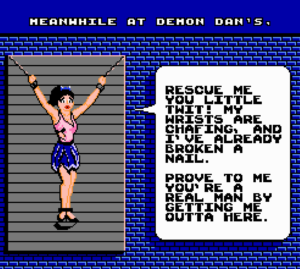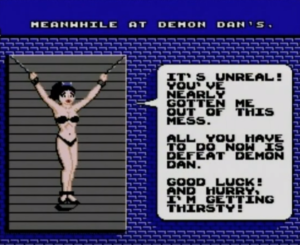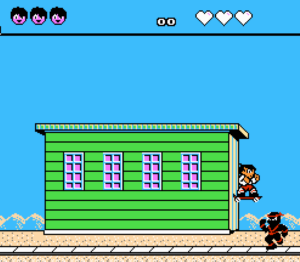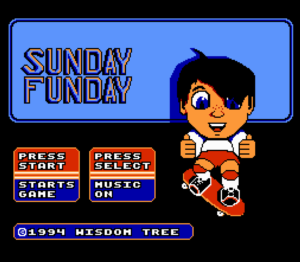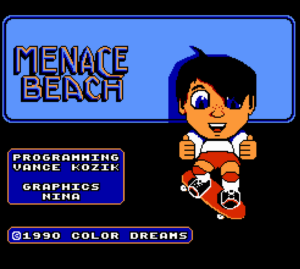 Back in the 1990’s, game developer Color Dreams produced a dozen or so unlicensed games for the Nintendo Entertainment System. Let me restate that: In a darker, more primitive time, some monsters formed a development company and created awful “games” for the NES, which they inflicted on poorly-informed parents who wanted cheap games. These games were of such low quality that Nintendo refused to grant them license to publish games for their system. Color Dreams reverse engineered the lockout chip present on every NES cartridge and made their games anyway.
Back in the 1990’s, game developer Color Dreams produced a dozen or so unlicensed games for the Nintendo Entertainment System. Let me restate that: In a darker, more primitive time, some monsters formed a development company and created awful “games” for the NES, which they inflicted on poorly-informed parents who wanted cheap games. These games were of such low quality that Nintendo refused to grant them license to publish games for their system. Color Dreams reverse engineered the lockout chip present on every NES cartridge and made their games anyway.
One of these abominations was their 1990 game Menace Beach, in which you must guide the skateboarding protagonist against an army of ninjas and Elvis impersonators to rescue your kidnapped girlfriend from Demon Dan. Between levels your girlfriend alternates between pleading with and taunting you, as her clothing becomes torn and tattered, eventually falling away.
The game itself, despite some interesting mechanical innovations, was mostly a cludgy, mediocre platformer. Your character could punch, jump, and execute a spinning skateboard attack by jumping and then attacking in mid-air. The character sprites had poor hit detection but were thoughtfully animated, with the ninjas moving through a variety of stances and the Elvis impersonators gyrating their pixelated hips.
The game was not very good, and even the inclusion of the weird fetish cutscenes wouldn’t have been enough to make it memorable. What the game became is more interesting.
You see, Color Dreams had a problem: Retailers who carried unlicensed game cartridges for Nintendo systems risked the wrath of Nintendo of America, who could revoke a distribution agreement if they found out that the retailer was selling these sub-par games. If you were a buyer for Wal-Mart or Electronics Boutique, you wouldn’t risk killing the cash cow of NES games to bring in a bunch of mediocre wanna-be games. It would be like a tabletop game store risking their status with Wizards of the Coast by breaking street date on a Magic: The Gathering release, or by selling the promotional give-away cards. Oh, wait. They do that regularly. Sigh. Moving on.
Somewhere in what I can only assume were the very sticky offices at Color Dreams, a solution was found: Market the games in Christian bookstores. These bookstores weren’t interested in mainstream video games, anyway, so they had nothing to lose. Color Dreams created a new label called Wisdom Tree and started rehashing their secular games with a Christian theme. One of these games was a hack of Menace Beach called Sunday Funday.
The player’s character was redrawn to be carrying a Bible. The punch attack was removed, with both ground and air attacks being that skateboard spin move. The ninjas and Elvis impersonators were replaced with generic white dudes and gourmet chefs. And Taunting Bondage Damsel? Replaced with a fully-clothed Sunday School teacher who berated you for being late and urged you to make best possible speed to church.
Sunday Funday also shipped with a fairly uninspired MIDI Karaoke rendition of 4Him‘s song The Ride. Now, having grown up in a Christian household and exposed to/afflicted by Contemporary Christian Music, I can tell you that 4Him wasn’t the worst Christian music ever, and The Ride was a fairly popular song on an album that sold pretty well. I have to wonder if Benson Records knew the kind of people they were dealing with. I’d very much like to talk to whatever label employee agreed to have the song included with the game, but I fear that I may never get the answers I desire.

Extra credit: Click here for an extra little slice of weirdness. I got nothing.
In high school, our youth group sang a version of Amazing Grace set to the tune of Peaceful Easy Feeling, with the verses being from John Newton’s hymn and the chorus coming from the song by the Eagles:
Amazing grace, how sweet the sound
That saved a wretch like me
I once was lost, but now I’m found
Was blind but now I see
And I’ve got a peaceful easy feeling
And I know you won’t let me down
‘Cause I’m already standing on the ground
Catchy, but hardly theologically correct in a church that preached total depravity. I scribbled down what I thought was a more appropriate chorus, and we tried it:
And I’ve got a broken, humbled spirit
‘Cause I know that I’ve let you down
But Father you have placed me on solid ground
It was a terrible flop. We put the new words on the overhead, but nobody cared, and everyone sang the version from The Eagles in defiance. Our pastor would later express regret for having approved either version of the song, calling it a “Philistine cart”. We all got the reference: Israel, having gotten possession of the Ark of the Covenant back from the Philistines, were given special instructions for how to return the Ark, including a new cart. They disregarded some of these instructions since it appeared that the cart the Philistines had used for their half of the trip seemed perfectly serviceable. When an ox pulling the cart stumbled, a man named Uzzah reached out to keep the Ark from falling, and, being in violation of the God-given instruction not to touch the Ark, promptly snuffed it.
The lesson given by preachers is that we should take care when mixing the mundane and the divine, but even if you’re not a believer, you can see the point. As Hank Hill would have said, Christian video games don’t make video games better, they just make Christianity worse. While it’s unclear whether the publishers of Menace Beach and Sunday Funday experienced any smiting as a result of their terrible Christian video game, they certainly didn’t receiving any temporal blessing from it, either: The company continued to be hounded in court by Nintendo, and both games were produced in such low quantities that they are now collector’s items worth well in excess of $100.
And now you know the story of Sunday Funday and the Philistine Cart.
